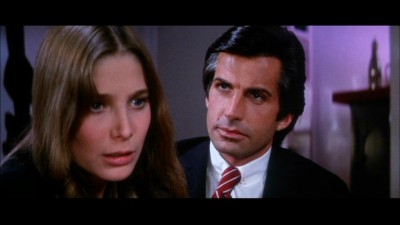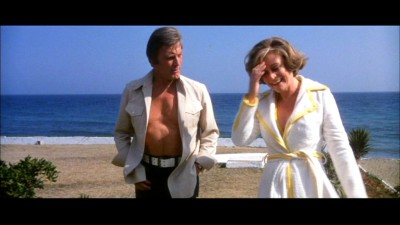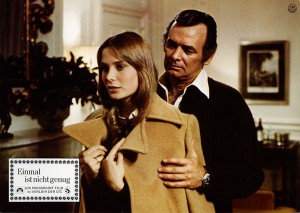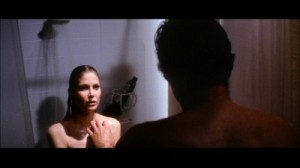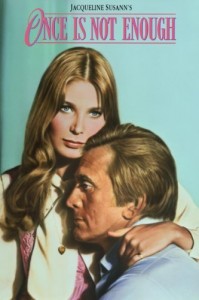From Monthly Film Bulletin, August 1975, Vol. 42, No. 499. — J.R.
Jacqueline Susann’s Once is Not Enough
U. S.A., 1974Director: Guy Green
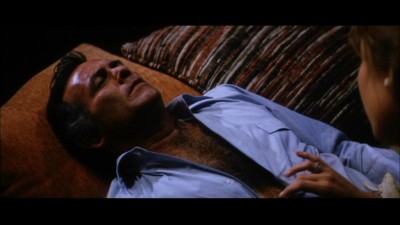
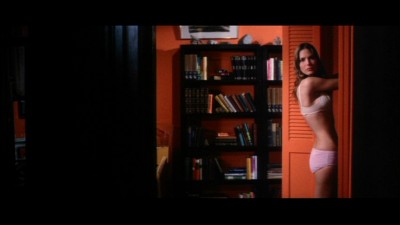
Cert--AA. dist–CIC. p.c–Paramount Pictures. In association with
Sujac Productions and Aries Films. exec. p–Irving Mansfield. p–Howard
W. Koch. p. manager–Howard W. Koch Jnr. asst. d–Howard W. Koch
Jnr., Lee Rafner. sc–Julius J. Epstein. Based on the novel Once Is Not
Enough by Jacqueline Susann. ph–John A. Alonzo. Panavision. col—
Movielab. ed–Rita Roland. p. designer--John DeCuir. a.d–David
Marshall. setdec–Ruby Levitt. m–Henry Mancini. songs—“Once Is
Not Enough” by Henry Mancini, Larry Kusik, sung by–The Mancni
Singers; “All the wav” by Sammy Cahn, James van Heusen, sung by
Frank Sinatra. titles–Dan Perri. sd. ed–Robert Cornett. sd. rec–Larry
Jost. sd. re-rec–Doc Wilkinson. l.p–Kirk Douglas (Mike Wayne),
Alexis Smith (Deidre Milford Granger), David Janssen (Tom Colt),
George Hamilton (David Milford), Melina Mercouri (Karla), Gary
Conway (Hugh Robertson), Brenda Vaccaro (Linda Riggs), Deborah
Raffin, (January Wayne), Lillian Randolph (Mabel), Renata Vanni (Maria),
Mark Roberts (Rhinegold), John Roper (Franco), Leonard Sachs (Dr.
Peterson), Jim Boles (Scotty), Ann Marie Moelders (Girl at El Morocco),
Trudi Marshall (Myrna), Eddie Garrett (Maitre d’ in Polo Lounge), Sid
Frohlich (Waiter), Kelly Lange (Weather Lady), Maureen McCluskey,
Harley Farber, Michael Millius and Tony Ferrara (Four Beautiful People).
10,970 ft. 122 mins.
After a series of operations following a motorcycle accident,
January Wayne flies from Geneva to New York to be with her
father Mike — a movie producer who gives her a lavish welcome —
but is shocked to discover that he has married Deidre Milford
Granger, the fifth richest woman in the world, in order to keep his
daughter in luxury. January gets a job from her former school chum
Linda Riggs on Gloss Magazine and a flat of her own in Linda’s
building. A virgin, she reluctantly lets herself be seduced by David
Milford — Deidre’s cousin, whom her stepmother wants her to
Marry –- but quickly loses interest in him; he meanwhile is having
an affair with Karla, Deidre’s clandestine lover. January meets
and falls in love with Tom Colt, a celebrated novelist at least twice
her age, whom Mike despises. Surprised when Tom makes no
physical advances towards her, she eagerly accepts his invitation to
join him for a weekend in West Hampton with his astronaut friend
Hugh Robertson, where she discovers that Tom has been impotent
for years — having fathered a son with his wife (from whom he is
now separated) via artificial insemination. He overcomes this
problem with January, however, and takes her along to Hollywood
when he is hired to adapt one of his own novels. Mike appears,
beats Tom up, and tries to get January to leave with him, but
she refuses. Mike prepares a new movie about young people and
decides to leave Deidre for January’s sake, but he and his wife are
killed in a plane crash. After Tom leaves, January flies to New
York to see him, but he announces that their affair is over. Linda,
meanwhile, has been fired from Gloss after sleeping with her boss;
January puts her to bed and sadly walks to the riverside at dawn,
remembering Mike (who has left her the $3,000,000 he made from
his last movie deal) as well as Tom, and realising that her days
of innocence are over.
With the advent of Jacqueline Susann’s Once Is Not Enough, the
magically improbable and incomparable wonderland of the late
authoress makes its final appearance, and thanks in part to Guy
Green’s slick direction, achieves something like its swan-song and
apotheosis. It is a world where sordid amorality reigns in high
places, at the top of skyscrapers — urban Peyton Places clogged with
jet-set types who harbour such dirty little secrets as artificial
insemination, drugs, virginity, homosexuality, lack of ideals,
promiscuity, Electra complexes and callow mercenary interests.
Once is clearly not enough to get the measure of Ms. Susann’s
patchwork cosmology, where a dewy-eyed daughter fresh from
Geneva is greeted by a Goodyear blimp sailing past the window
of her sumptuous hotel suite announcing “Welcome home,
January !” in blazing lights, and even a minor character in her
starstruck path turns out to be at least a minor astronaut. It is
a definitive world where definitive people with definitive names
(Tom Colt, Mike Wayne, Robin Stone in The Love Machine) say definitive
things, such as the film’s title (January: “We had something special once,
didn’t we ?” Tom: ‘Yeah”. January: “But once is not enough !”), or “You
just cut my balls off in front of my daughter” (appropriately uttered
by Kirk Douglas between clenched teeth), or Mike’s explanation of his
daughter’s name (“Because she was born on New Year’s Day and I
swore I would give her the world”). A world suggesting a high-powered
blend of Ayn Rand and Harold Robbins, where George Hamilton has
greying temples, Gucci shoes and a playboy penthouse resembling a
banana split; where all novelists have Pulitzer Prizes and look like
Norman Mailer, all producers have Oscars and look like Kirk Douglas,
and all serious-thinking heiresses collect driftwood on the seashore
and take melancholy walks along the river at dawn, dreaming of what is
past and what is yet to come. Poised before an uncertain future
without the benefit of Colt or Gloss, with little more than memories
and three cool million to call her own, January — played by newcomer
Deborah Raffin in the best Diane Varsi/Ali McGraw tradition — teeters
wordlessly on the threshold of life at the end of Jacqueline Susann’s
dark night of the soul, perhaps wondering (along with the audience)
whether even once might be three times too many.
JONATHAN ROSENBAUM
